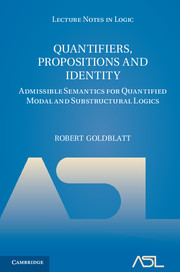 Quantifiers, Propositions and Identity
Quantifiers, Propositions and Identity Book contents
CHAPTER 6 - COVER SEMANTICS FOR RELEVANT LOGIC
Published online by Cambridge University Press: 07 September 2011
Summary
The main aim of this chapter is to set out a new kind of admissible model theory for the propositional relevant logic R and its quantified extension RQ. First we review the relational semantics for R of Routley and Meyer [1973], and its adaptation by Mares and Goldblatt [2006] to an admissible semantics for RQ. Then we introduce an alternative kind of structure, called a cover system, motivated by topological ideas about “local truth” from the Kripke-Joyal semantics for intuitionistic logic in topos theory. These are combined with a modelling of negation by a binary world-relation of orthogonality, or incompatibility, as in [Goldblatt 1974], and an operation of combination, or “fusion”, of worlds to interpret relevant implication. Characteristic model systems for R have an algebra Prop of admissible propositions, while those for RQ have a set PropFun of admissible propositional functions as well.
We then show that by conservatively adding an intuitionistic implication connective to R it is possible to characterise that logic by models in which all possible propositions are admissible. The prospects for a similar analysis of RQ are considered at the end.
Routley-Meyer Models for R
The subject of relevant logic (also known as relevance logic) is based on the view that an implication A → B can only be true if the meaning of A is relevant to the meaning of B.
- Type
- Chapter
- Information
- Quantifiers, Propositions and IdentityAdmissible Semantics for Quantified Modal and Substructural Logics, pp. 203 - 250Publisher: Cambridge University PressPrint publication year: 2011


